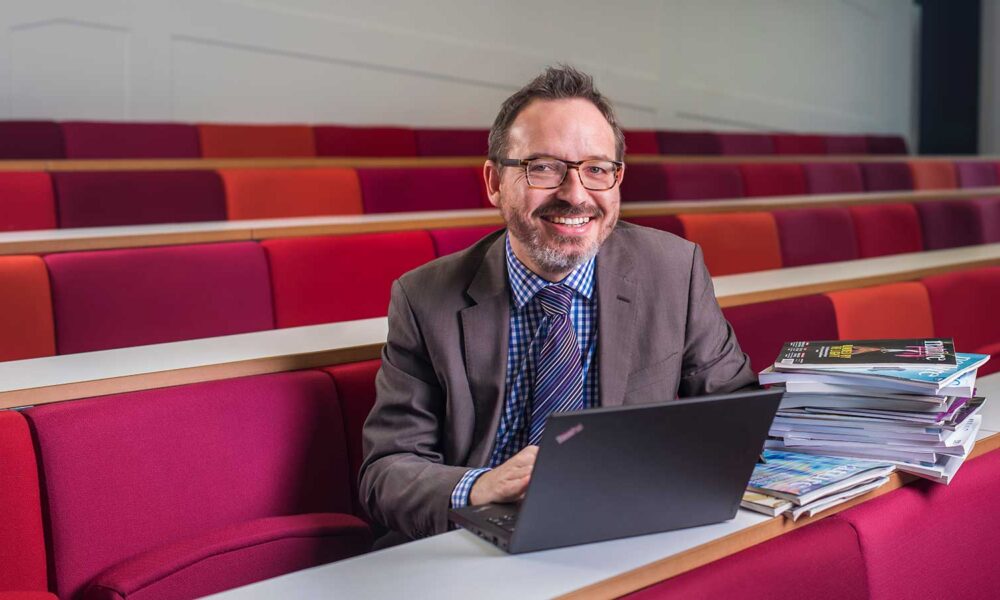
Professor Paul Townsend was previously the Associate Dean of the Faculty of Biology, Medicine and Health at the University of Manchester and Deputy Head of the Division of Cancer Sciences. In addition, he held the role of Industry and Innovation lead for the Manchester Academic Health Science Centre, the Manchester Biomedical Research Centre and co-founded three companies; Karus Therapeutics, Pentagon Therapeutics and PRECignature.
We spoke with him to discuss his future role and vision in bringing academia and industry closer together to provide healthcare solutions.
What attracted you to the University of Surrey?
To me it is simple – the University of Surrey has exciting aspirations. It has a vision to create interconnection between not only all health and medical disciplines with its One Health agenda, but across all Faculties. It is also committed to improving links between businesses, Government and public institutions to make an impact. The research and teaching output from FHMS are worldclass but the Faculty also benefits from its links with companies at Surrey Research Park and Royal Surrey County Hospital which is located right on its doorstep.
Do you think COVID-19 will change the direction of healthcare research?
Without a shadow of doubt the pandemic will influence healthcare research but in a positive way. It has promoted altruism, knowledge exchange and collaboration at an unprecedented level. By utilising technology and data and undertaking research virtually, change and progress have happened at a speed never seen before. It has left an indelible imprint on our psyche, bringing innovation, efficiency and collaboration to the forefront of health and medical research.
There is a significant and rapidly growing healthcare cluster on Surrey Research Park. How do you envisage the Faculty will work with our tenants in the forthcoming years?
We can’t sit in silos. Academia may give you ‘blue sky ideas’ but businesses, innovators and entrepreneurs turn these into real life solutions. We need to work in a tripartite way with scientists, entrepreneurs and the NHS. With the Government committing to invest 2.4% of GDP into R&D by 2027, billions of pounds are being pumped into our sector; no-where in the world is doing this at such a level. The Faculty will be looking to work with the tenants at Surrey Research Park to maximise these funding opportunities.
Part of the Faculty is located on Surrey Research Park. What is important to the Faculty about where it is located?
It is very advantageous that the Faculty is based amongst so many healthcare solutions companies at Surrey Research Park as well as being located right next to the Hospital. Co-location leads to ideas and opportunities. Whilst technology has enabled virtual research and collaboration, meeting in person can’t be underestimated for its impact on collective work. Most researchers want to work locally with industry, not least because such proximity often speeds up the process of proof of principle work for funding opportunities. I am also eager to promote and grow academic entrepreneurs and by partnering with the Research Park we can make that a reality.
What do you think is the next big thing in healthcare research?
Simply data, in real time which is real world. Electronic medical records will better inform and predict public health pandemics and the underlying biology. However, on the other scale of things, data will help lead to better ownership of one’s own health; allowing for precision monitoring, detecting early warning signs and promptly intervening and offering guidance to help high risk patients.
What are your main priorities in your new role?
To align the USPs of the Faculty, University and the innovation community within Surrey Research Park. With an emphasis on collective ownership, I will concentrate on our differentiators then focus on funding opportunities by encouraging partnerships with businesses, other universities and healthcare solutions and technology providers. I already have made some enquiries and there is appetite to drive this forward.
From your experience, what are the key components to successfully converting research into commercial success?
Have a realistic vision and business plan; ask for professional advice; seek funding, partnership and knowledge transfer opportunities early and learn to fail fast; recognise when you should let go of your ‘baby’.
Why did you choose a career in healthcare research?
I have always been interested in biology. I remember wearing my doctor’s kit as a 4-year-old and studying the formation of leaves through my microscope on my bedroom windowsill. Throughout my childhood, I remained curious and passionate about the subject. And as an adult I chose to specialise in prostate cancer due to a family loss to the disease.
What is your advice to students who wish to become entrepreneurs?
Talk to people; find out opportunities, understand the ‘language’ of business across all domains. Then go for it, there is nothing to lose!